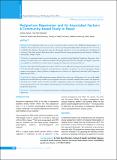Please use this identifier to cite or link to this item:
https://hdl.handle.net/20.500.14356/1385Full metadata record
| DC Field | Value | Language |
|---|---|---|
| dc.contributor.author | Chalise, Anisha | - |
| dc.contributor.author | Bhandari, Tulsi Ram | - |
| dc.date.accessioned | 2023-05-09T09:45:40Z | - |
| dc.date.available | 2023-05-09T09:45:40Z | - |
| dc.date.issued | 2019 | - |
| dc.identifier.citation | ChaliseA., & BhandariT. R. (2019). Postpartum Depression and its Associated Factors: A Community-based Study in Nepal: Postpartum Depression in Nepal. Journal of Nepal Health Research Council, 17(2), 200-205. https://doi.org/10.33314/jnhrc.v0i0.1635 | en_US |
| dc.identifier.issn | Print ISSN: 1727-5482; Online ISSN: 1999-6217 | - |
| dc.identifier.uri | http://103.69.126.140:8080/handle/20.500.14356/1385 | - |
| dc.description | Original Article | en_US |
| dc.description.abstract | Abstract Background: Postpartum depression is a type of mental disorder associated with childbirth during pregnancy or within the first postpartum year. It is reported as a common psychological health problem affecting 10-15% of women worldwide. The duration of postpartum depression frequently depends on its severity and the time of initiation of treatment. This study assessed depression and its associated factors among postpartum period women of Godavari municipality, Lalitpur, Nepal. Methods: A community-based cross-sectional study was conducted using Edinburg Postpartum Depression Scale among 195 mothers who were within six months of the postpartum period. The chi-square and logistic regression were applied to establish the association between postpartum depression and associated factors. Results: Out of the total 195 postpartum women, 37(19%) women suffered from depression and out of those women 2.1% had suicidal thoughts. Among the associated factors, education, occupation, the intent of pregnancy, family support and pregnancy-related problems/complications were found to be significantly associated with Postpartum depression (p<0.05). Conclusions: Nearly one-fifth postpartum women suffered from some type of depression. It is one of the public health concerns which directly or indirectly corresponds to the socio-economic condition of the women. The improved education and economic status of women, intention of pregnancy, family care and support during pregnancy and the postpartum period and early diagnosis and management of health problems could reduce the magnitude of the postpartum depression. Keywords: Associated factors of postpartum depression; edinburg postpartum depression scale; Nepal; postpartum depression | en_US |
| dc.language.iso | en | en_US |
| dc.publisher | Nepal Health Research Council | en_US |
| dc.relation.ispartofseries | Apr-June, 2019;1635 | - |
| dc.subject | Associated factors of postpartum depression | en_US |
| dc.subject | edinburg postpartum depression scale | en_US |
| dc.subject | Nepal | en_US |
| dc.subject | postpartum depression | en_US |
| dc.title | Postpartum Depression and its Associated Factors: A Community-based Study in Nepal | en_US |
| dc.type | Journal Article | en_US |
| local.journal.category | Original Article | - |
| Appears in Collections: | Vol. 17 No. 2 Issue 43 Apr - Jun 2019 | |
Files in This Item:
| File | Description | Size | Format | |
|---|---|---|---|---|
| 1635-Manuscript-10745-1-10-20190804.pdf | Fulltext Download | 240.24 kB | Adobe PDF |  View/Open |
Items in DSpace are protected by copyright, with all rights reserved, unless otherwise indicated.
